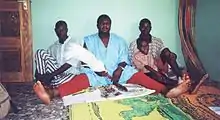Babalawo
Babaaláwo or Babalawo in West Africa (Babalao in Caribbean and South American Spanish and Babalaô in Brazilian Portuguese) literally means "father of secrets"[1] in the Yoruba language. It is a spiritual title that denotes a high priest of the Ifá oracle. Ifá is a divination system that represents the teachings of the Òrìṣà Ọrunmila, the Òrìṣà of Wisdom, who in turn serves as the oracular representative of Olodumare.
| Part of a series on |
| Yoruba religion |
|---|
 |
| Deities |
| Beliefs |
| Practices |
| Variants |
|
| Sacred sites |
| Legendary figures |

Functions in society
The Babalawos are believed to ascertain the future of their clients through communication with Ifá. This is done through the interpretation of either the patterns of the divining chain known as Opele, or the sacred palm nuts called Ikin, on the traditionally wooden divination tray called Opon Ifá.
In addition to this, some of them also perform divination services on behalf of the kings and paramount chiefs of the Yoruba people. These figures, holders of chieftaincy titles like Araba and Oluwo Ifa in their own right, are members of the recognised aristocracies of the various Yoruba traditional states.
People can visit Babalawos for spiritual consultations, which is known as Dafa. The religious system as a whole has been recognized by UNESCO as a “Masterpiece of the Oral and Intangible Heritage of Humanity."
In popular culture
- "Calle Luna, Calle Sol", a salsa song by Willie Colón and Héctor Lavoe about Crime in Puerto Rico, mentions Babalawo saying "you may have a saint watching over you but you're not a Babalawo" (Tu tienes un santo pero no eres babalao).[2]
References
- Olupona, Jacob K. (2014). African Religions: A Very Short Introduction. Oxford: Oxford University Press. p. 45. ISBN 978-0-19-979058-6. OCLC 839396781.
- "Sanjuaneros recuerdan la trama de "Calle Luna, calle Sol", cantada por Lavoe". San Diego Union-Tribune en Español (in Spanish). October 27, 2014. Retrieved August 15, 2023.